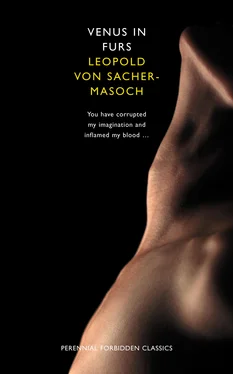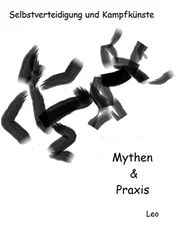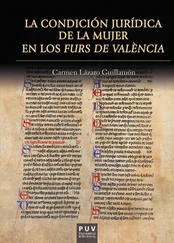‘You don’t share it?’
‘I do not share it,’ she said quickly and decisively, shaking her head, so that her curls flew up like red flames.
‘The ideal which I strive to realise in my life is the serene sensuousness of the Greeks – pleasure without pain. I do not believe in the kind of love which is preached by Christianity, by the moderns, by the knights of the spirit. Yes, look at me, I am worse than a heretic, I am a pagan.
Doest thou imagine long the goddess of love took
counsel
When in Ida’s grove she was pleased with the hero
Achilles?
These lines from Goethe’s Roman Elegy have always delighted me.
‘In nature there is only the love of the heroic age, “when gods and goddesses loved”. At that time “desire followed the glance, enjoyment desire”. All else is factitious, affected, a lie. Christianity, whose cruel emblem, the cross, has always had for me an element of the monstrous, brought something alien and hostile into nature and its innocent instincts.
‘The battle of the spirit with the senses is the gospel of modern man. I do not care to have a share in it.’
‘Yes, Mount Olympus would be the place for you, madame,’ I replied; ‘but we moderns can no longer support the antique serenity, least of all in love. The idea of sharing a woman, even if it were an Aspasia, with another, revolts us. We are jealous as is our God. For example, we have made a term of abuse out of the name of the glorious Phryne.
‘We prefer one of Holbein’s meagre, pallid virgins, which is wholly ours, to an antique Venus, no matter how divinely beautiful she is, who loves Anchises today, Paris tomorrow, Adonis the day after. And if nature triumphs in us so that we give our whole glowing, passionate devotion to such a woman, her serene joy of life appears to us as something demonic and cruel, and we read into our happiness a sin which we must expiate.’
‘So you too are one of those who rave about modern women, those miserable hysterical feminine creatures who don’t appreciate a real man in their somnambulistic search for some dream man and masculine ideal. Amid tears and convulsions they daily outrage their Christian duties; they cheat and are cheated; they always seek again and choose and reject; they are never happy, and never give happiness. They accuse fate instead of calmly confessing that they want to love and to live as Helen and Aspasia lived. Nature admits of no permanence in the relation between man and woman.’
‘But, my dear lady –’
‘Let me finish. It is only man’s egoism which wants to keep woman like some buried treasure. All endeavours to introduce permanence in love, the most changeable thing in this changeable human existence, have suffered shipwreck in spite of religious ceremonies, vows and legalities. Can you deny that our Christian world has given itself over to corruption?’
‘But –’
‘But you are about to say, the individual who rebels against the arrangements of society is ostracised, branded, stoned. So be it. I am willing to take the risk; my principles are very pagan. I will live my own life as it pleases me. I am willing to do without your hypocritical respect; I prefer to be happy. The inventors of the Christian marriage have done well, simultaneously to invent immortality. I, however, have no wish to live eternally. When with my last breath everything as far as Wanda von Dunajew is concerned comes to an end here below what does it profit me whether my pure spirit joins the choirs of angels, or whether my dust goes into the formation of new beings? Shall I belong to one man whom I don’t love, merely because I have once loved him? No, I do not renounce; I love everyone who pleases me, and give happiness to everyone who loves me. Is that ugly? No, it is more beautiful by far, than if cruelly I enjoy the tortures which my beauty excites and virtuously reject the poor fellow who is pining away for me. I am young, rich, and beautiful, and I live serenely for the sake of pleasure and enjoyment.’
While she was speaking her eyes sparkled roguishly, and I had taken hold of her hands without exactly knowing what to do with them, but being a genuine dilettante I hastily let go of them again.
‘Your frankness,’ I said, ‘delights me, and not it alone –’
My confounded dilettantism again throttled me as though there were a rope around my neck.
‘You were about to say –’
‘I was about to say – I was – I am sorry – I interrupted you.’
‘How, so?’
A long pause. She is doubtless engaging in a monologue, which translated into my language would be comprised in the single word, ‘donkey’.
‘If I may ask,’ I finally began, ‘how did you arrive at these – these conclusions?’
‘Quite simply, my father was an intelligent man. From my cradle onwards I was surrounded by replicas of ancient art; at ten years of age I read Gil Blas, at twelve La Pucelle. Where others had Tom Thumb, Bluebeard, Cinderella, as childhood friends, mine were Venus and Apollo, Hercules and Laocoön. My husband’s personality was filled with serenity and sunlight. Not even the incurable illness which fell upon him soon after our marriage could long cloud his brow. On the very night of his death he took me in his arms, and during the many months when he lay dying in his wheelchair, he often said jokingly to me: “Well, have you already picked out a lover?” I blushed with shame. “Don’t deceive me,” he added on one occasion, “that would seem ugly to me, but pick out an attractive lover, or preferably several. You are a splendid woman, but still half a child, and you need toys.”
‘I suppose, I hardly need tell you that during his lifetime I had no lover; but it was through him that I have become what I am, a woman of Greece.’
‘A goddess,’ I interrupted.
‘Which one,’ she smiled.
‘Venus.’
She threatened me with her finger and knitted her brows. ‘Perhaps, even a “Venus in Furs”. Watch out, I have a large, very large fur, with which I could cover you up entirely, and I have a mind to catch you in it as in a net.’
‘Do you believe,’ I said quickly, for an idea which seemed good, in spite of its conventionality and triteness, flashed into my head, ‘do you believe that your theories could be carried into execution at the present time, that Venus would be permitted to stray with impunity among our railroads and telegraphs in all her undraped beauty and serenity?’
‘ Undraped, of course not, but in furs,’ she replied smiling. ‘Would you care to see mine?’
‘And then –’
‘What then?’
‘Beautiful, free, serene, and happy human beings, such as Greeks were, are only possible when it is permitted to have slaves who will perform the prosaic tasks of every day for them and above all else labour for them.’
‘Of course,’ she replied playfully, ‘an Olympian divinity, such as I am, requires a whole army of slaves. Beware of me!’
‘Why?’
I myself was frightened at the hardiness with which I uttered this ‘why’; it did not startle her in the least.
She drew back her lips a little so that her small white teeth became visible, and then said lightly, as if she were discussing some trifling matter, ‘Do you want to be my slave?’
‘There is no equality in love,’ I replied solemnly. ‘Whenever it is a matter of choice for me of ruling or being ruled, it seems much more satisfactory to me to be the slave of a beautiful woman. But where shall I find the woman who knows how to rule, calmly, full of self-confidence, even harshly, and not seek to gain her power by means of petty nagging?’
‘Oh, that might not be so difficult.’
‘You think –’
‘I – for instance –’ she laughed and leaned far back – ‘I have a real talent for despotism – I also have the necessary furs – but last night you were really seriously afraid of me!’
Читать дальше












